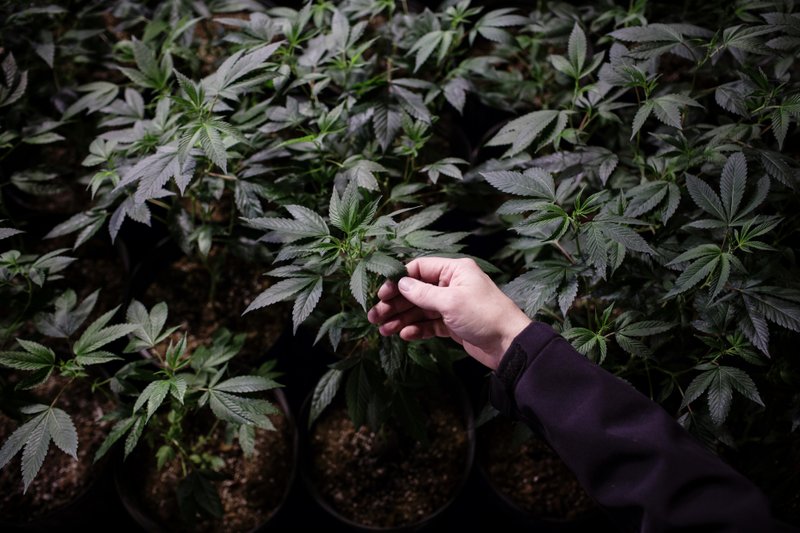You are here
Home 🌿 Marijuana Politics 🌿 Legal supply scant, Canada pot dealers still busy on corner 🌿Legal supply scant, Canada pot dealers still busy on corner

The legal cannabis stores that opened in Montreal last fall still look pristine. Curious customers file in, but the shelves they peruse are often bare. Supplies are so short the stores are shuttered three days a week.
A few blocks from one outlet, though, a longtime pot dealer was receiving a stream of text alerts one afternoon this winter, a sign of booming business.
When the government opened Canada's official recreational-pot market on Oct. 17, it was banking on the idea that many users would prefer to buy legally and that the black market would quickly begin to fade. It says things seem on track, with "early reports of a 65 percent reduction for illegally sourced products," according to a spokesman for the minister in charge of the cannabis file.
But there are also signs things aren't going as expected.
In a national poll Ipsos conducted for Global News a month after legalization, more than a third of Canadian cannabis users said they were still buying from their regular dealers and hadn't even tried the legal system. Five illegal sellers in Quebec told The Washington Post their sales are up slightly.
To the black marketeers, the bare-bones legal supplies are "pretty much a running joke," said David, the busy Montreal dealer, who spoke on the condition that his last name not be used to avoid police attention.
Many researchers, politicians and investors see the state of the black market as an important gauge of the new policy's success.
Illegal cannabis sales are notoriously hard to measure. In Washington state, for example, experts' best estimate six years after legalization is that there's still "a non-trivial black market," said Mark Kleiman, a New York University professor and expert on cannabis legalization. Still, he noted, "it's clearly less than half the total market."
Canada, however, is taking a different approach from Washington or states such as Colorado, which also legalized recreational pot in 2012 and has made similar progress in reducing illicit sales.
The Canadian government's most jolting decision, illegal dealers said, was to structure the new industry in a way that tended to bar them from it. In 2015, when the government first committed to legalization, many of them planned to apply to open private shops.
"All of us thought, 'OK ... I'm going to be able to come out of the shadows and I'm going to be able to pay taxes,'" David said. "As time went on, it became clear that's not what they were after."
In Quebec and several other Canadian provinces, all cannabis stores are government-run, leaving no path to legality for people like David, who has worked in the underground industry for more than a decade, operating his business full time for several years.
Colorado and other U.S. jurisdictions, by contrast, gave many small-scale dealers a chance at a legal job.
"That's a huge difference," said Lewis Koski, former director of the Colorado Marijuana Enforcement Division and now a consultant on legalization. "I can't think of a state here in the U.S. that has a government-control model similar to ... Canada's."
Even in provinces that do allow private shops or dispensaries, including Alberta, Saskatchewan and Manitoba, small businesses face high barriers. It costs almost $5,000 just to apply for a license, and if approved, $23,000 each year thereafter in regulatory fees, with provinces often adding their own charges.
Shutting out many in the black market has already triggered a vicious cycle, said Dan Malleck, an expert in drug and alcohol regulation from Brock University in Ontario. It helped ensure the initial undersupply of legal pot by preventing a huge volume of illicit pot from being folded in. The shortage is now driving customers back to the black market, further reinforcing it.
"They should have not just stockpiled," Malleck said of authorities. "They should have created a mechanism that allowed illegal producers to move quickly into the legal producing system."
Canadian provincial governments also have emphasized another strategy that wasn't popular south of the border: police crackdowns.
Cracking down when legal supplies are still low and demand is therefore high for black-market pot hasn't generally been seen as useful, according to Kleiman. "There's no point," he said. Only after the first year or two, when legal supplies match market demand, should officials try "to vigorously drive the illicit guys out."
420 Intel is Your Source for Marijuana News
420 Intel Canada is your leading news source for the Canadian cannabis industry. Get the latest updates on Canadian cannabis stocks and developments on how Canada continues to be a major player in the worldwide recreational and medical cannabis industry.
420 Intel Canada is the Canadian Industry news outlet that will keep you updated on how these Canadian developments in recreational and medical marijuana will impact the country and the world. Our commitment is to bring you the most important cannabis news stories from across Canada every day of the week.
Marijuana industry news is a constant endeavor with new developments each day. For marijuana news across the True North, 420 Intel Canada promises to bring you quality, Canadian, cannabis industry news.
You can get 420 Intel news delivered directly to your inbox by signing up for our daily marijuana news, ensuring you’re always kept up to date on the ever-changing cannabis industry. To stay even better informed about marijuana legalization news follow us on Twitter, Facebook and LinkedIn.




